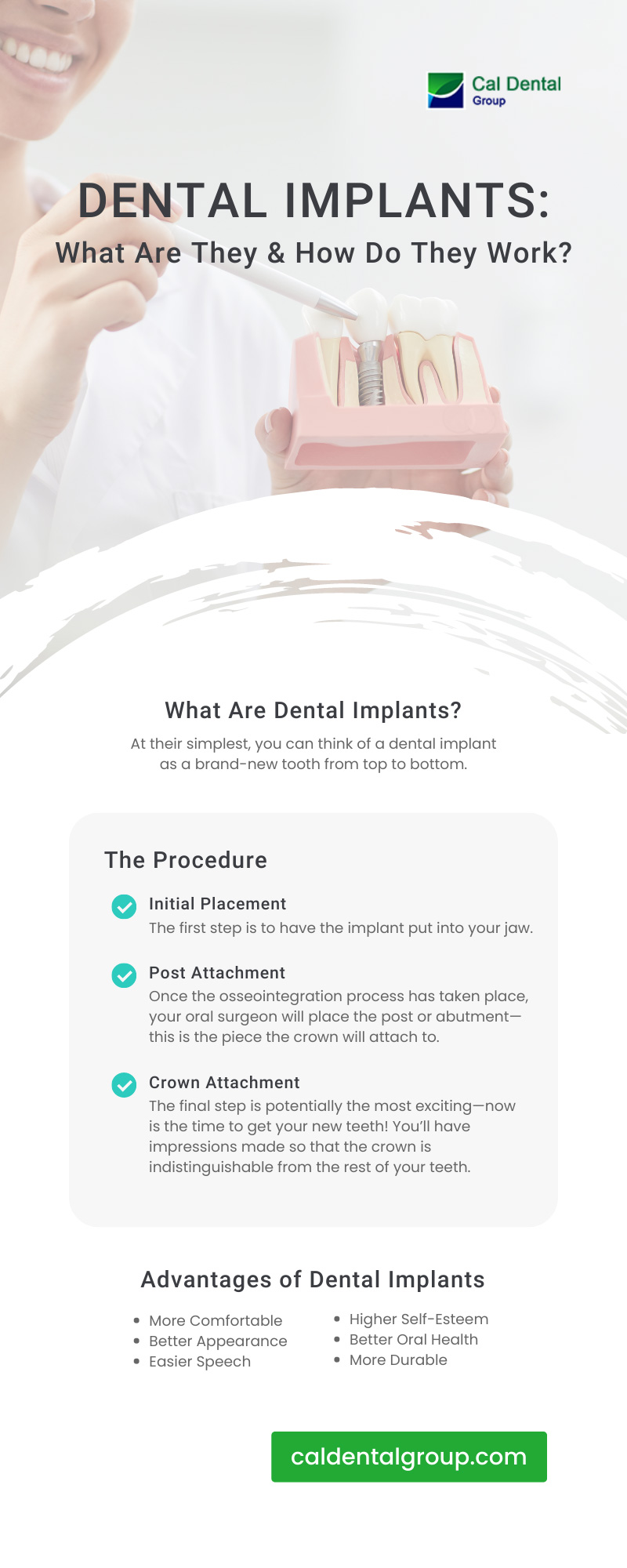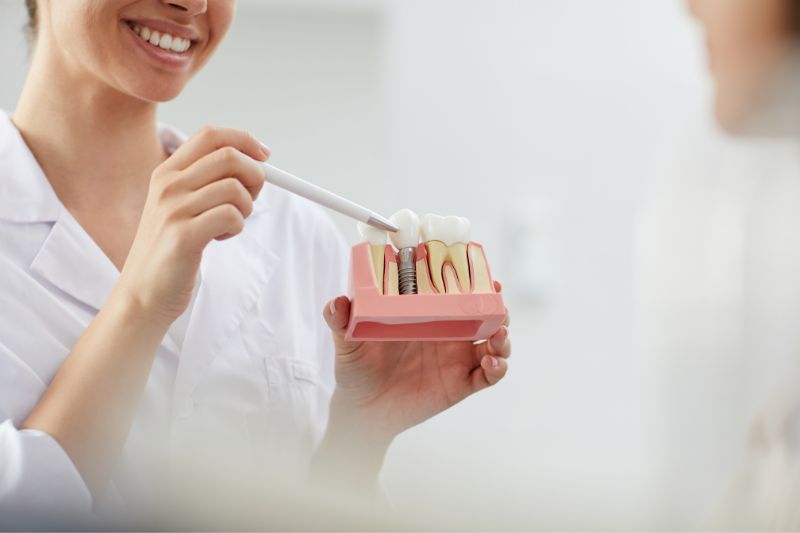While some people feel dentures or bridges are the answer to missing teeth, others would rather enjoy a more permanent solution. Even though dentures and bridges may look similar to natural teeth, they can slide around and even fall out of your mouth, making daily life a real struggle. Read on to learn more about dental implants, including what they are and how they work.
What Are Dental Implants?
At their simplest, you can think of a dental implant as a brand-new tooth from top to bottom. While other solutions may be more cosmetic, dental implants install a new tooth—root and all. They act as a permanent, strong foundation for the replacement of teeth and provide a natural feel that you can’t replicate with other means.
The piece “implanted” is a screw or cylinder that acts as a new root for your replacement tooth. The implants use a completely safe material that attaches to your gum tissue and jawbone, such as titanium.
Something essential to consider is that you must have good oral health beyond the missing teeth to be eligible for the dental implant procedure. Good oral health means a healthy jawbone and gums—otherwise, your mouth won’t be able to support your implants.
The Procedure
Once you’ve spoken with your dentist and confirmed that you are eligible for dental implants, you’re ready to begin the process. The full procedure will take a few months to complete (but don’t worry, you’ll spend most of your time at home)!
Initial Placement
The first step is to have the implant put into your jaw. For a dental implant to be a permanent solution, your oral surgeon will place the implant into your jawbone. Once this step is complete, the waiting begins. It usually takes three to five months for osseointegration to take place.
Osseointegration is a complicated way to say that your jawbone and dental implant become one unit—a durable base for your replacement teeth.
Post Attachment
Once the osseointegration process has taken place, your oral surgeon will place the post or abutment—this is the piece that acts as your tooth. Then, your crown will be attached to the abutment. Your surgeon opens your gum, attaches the post to the implant, and closes your gum around the post. After around two weeks of healing, your gum tissue will grow around the post, ready to receive a crown and complete the process.
Crown Attachment
The final step is potentially the most exciting—now is the time to get your new teeth! You’ll have impressions made so that the crown is indistinguishable from the rest of your teeth.
Advantages of Dental Implants
There are a lot of reasons to choose dental implants, especially over dentures. Surgery can make some people nervous, but you don’t have to worry—in general, dental implants have an incredible success rate!
More Comfortable
Your oral surgeon and dentist design the implants to be a part of you. Whereas dentures can slide around and feel awkward in your mouth, the appeal of implants is that they’re indistinguishable from your other teeth. As long as you’re comfortable with the other teeth in your mouth, you’ll be comfortable with dental implants!
Better Appearance
In addition to feeling good in your mouth, they also look great. Because your dental care team takes impressions of your teeth to design your implants, they actually look like the other teeth in your mouth. Dentures may not have the same feature and can stick out like a sore thumb, while implants blend in with the rest of your teeth.
Easier Speech
When dentures or bridges don’t fit correctly, they can make speech a significant headache. You may find yourself slurring your words or mumbling through sentences even when you used to speak clearly. Dental implants won’t slip around in your mouth and will allow you to speak as you normally would.
Higher Self-Esteem
Along with a better appearance and easier speech comes higher self-esteem. You don’t need to worry about what others think of your new teeth—they won’t even notice them! If you’re looking for dental implants in Los Angeles, you’ve come to the right place. Contact Cal Dental Group today to learn more about implants.
Better Oral Health
Your dentist may have to reduce other teeth for tooth-replacement procedures like tooth-supported bridges. Dental implants do not have this requirement, which allows more of your teeth to stay intact and bolsters the long-term health of your mouth.
More Durable
Implants are incredibly strong and can easily last for your whole lifetime. You should get regular checkups so your dentist can ensure that they’re working properly, but the implant itself will stay strong. You may need to replace the crown after around 10 or 15 years, but that’s due to normal wear and tear. If you take good care of your crown, it could also last more than 15 years!
Now that you know more about dental implants and how they work, decide for yourself whether they’re right for you. Remember, dental implants offer a long-lasting solution and come with a wide range of benefits!


